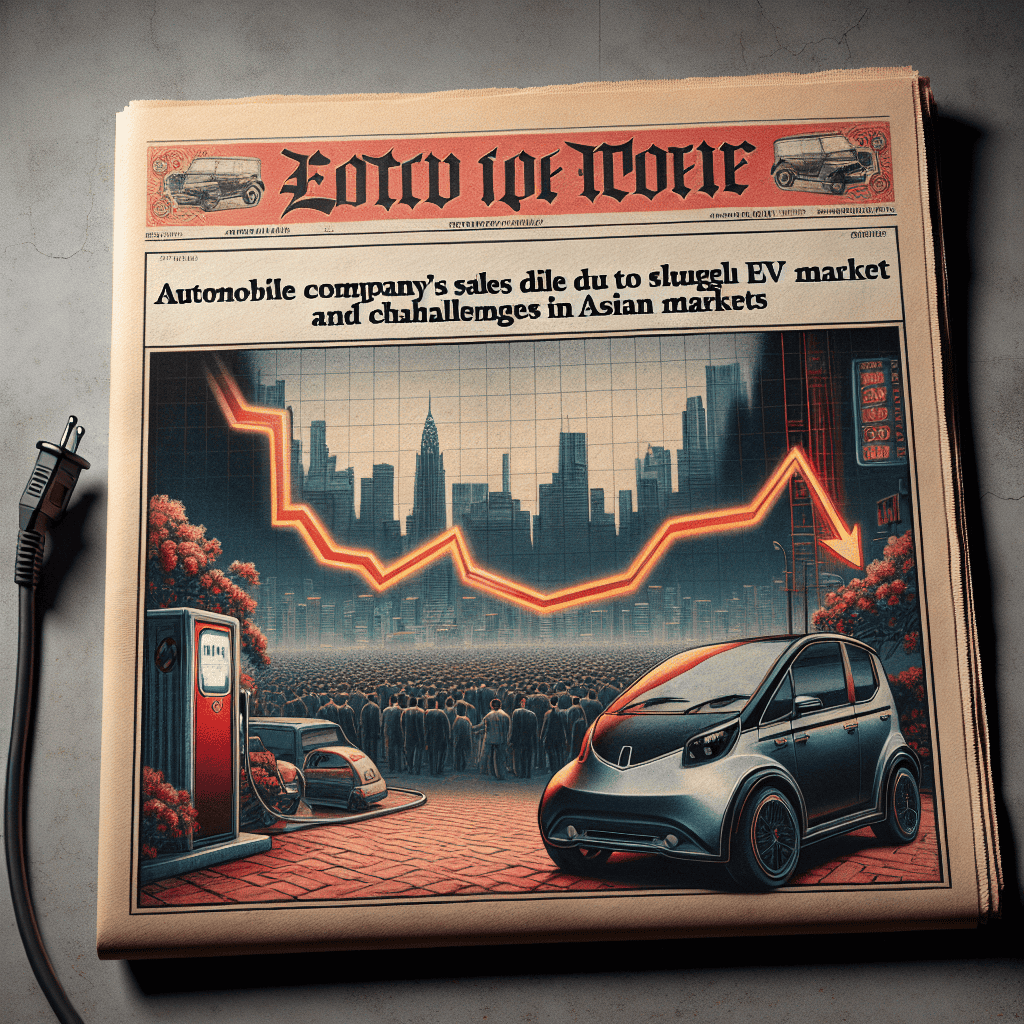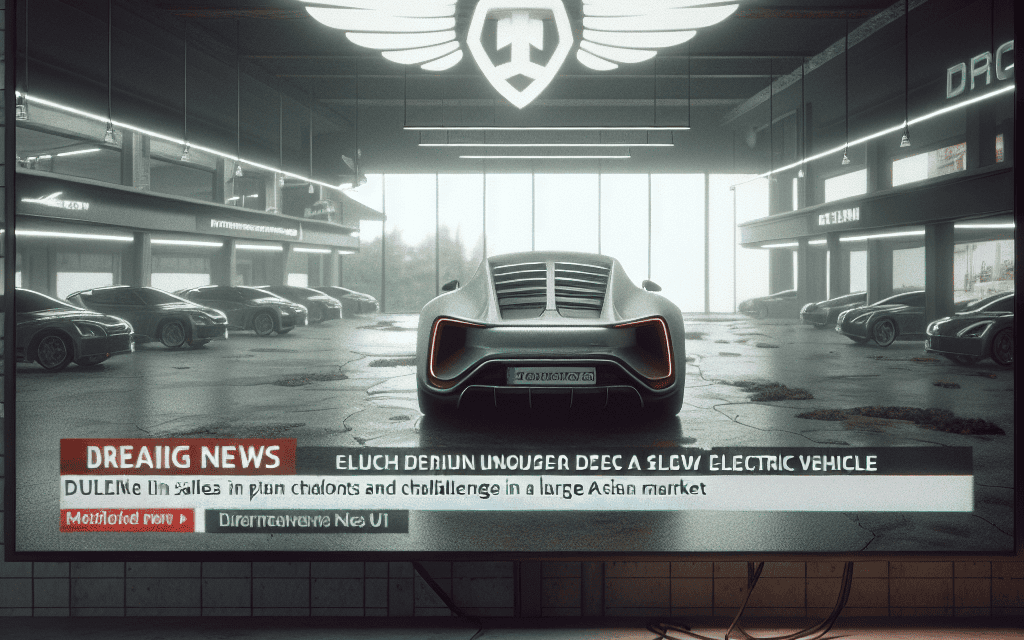“Porsche AG: Navigating the Roadblocks of a Shifting EV Market and China’s Economic Hurdles.”
Introduction
Porsche AG, the renowned German automobile manufacturer, is experiencing a notable decline in sales, primarily attributed to the sluggish growth of the electric vehicle (EV) market and significant challenges in China. As the global automotive industry undergoes a transformative shift towards electrification, Porsche’s ambitious plans to expand its EV lineup have encountered unexpected hurdles. The slower-than-anticipated adoption of electric vehicles, coupled with intensified competition and regulatory complexities in China, has impacted Porsche’s sales performance. This downturn highlights the intricate dynamics of the evolving automotive landscape and underscores the need for strategic adaptations to navigate the challenges posed by both market-specific and global trends.
Impact Of The Sluggish EV Market On Porsche AG’s Sales
Porsche AG, a renowned name in the luxury automotive industry, has recently faced a decline in sales, primarily attributed to the sluggish electric vehicle (EV) market and challenges in China. This downturn marks a significant moment for the company, which has been investing heavily in its transition towards electric mobility. As the global automotive landscape shifts towards sustainable solutions, Porsche’s experience highlights the complexities and hurdles that even established brands encounter in this evolving market.
The electric vehicle market, once heralded as the future of the automotive industry, has encountered unexpected slowdowns. Several factors contribute to this sluggishness, including supply chain disruptions, fluctuating raw material costs, and consumer hesitancy. For Porsche, these challenges have been particularly pronounced. The company has been at the forefront of integrating electric technology into its lineup, with models like the Taycan representing its commitment to innovation. However, the anticipated rapid adoption of EVs has not materialized as quickly as expected, impacting sales figures.
Moreover, the situation in China, one of Porsche’s key markets, has compounded these difficulties. China, with its vast consumer base and growing appetite for luxury vehicles, has been a critical region for Porsche’s growth strategy. However, recent economic uncertainties and regulatory changes have created a challenging environment for automakers. The Chinese government’s stringent policies on emissions and its push for local EV production have placed additional pressure on foreign manufacturers like Porsche. Consequently, the brand has had to navigate a complex landscape of compliance and competition, which has affected its sales performance.
In addition to these external factors, internal challenges have also played a role in Porsche’s sales decline. The transition to electric vehicles requires significant investment in research and development, infrastructure, and marketing. While Porsche has made commendable strides in these areas, the financial burden of such a transition cannot be underestimated. Balancing the costs of innovation with the need to maintain profitability is a delicate act, and any misstep can have repercussions on sales and market positioning.
Despite these challenges, Porsche remains committed to its long-term vision of sustainable mobility. The company continues to invest in expanding its EV lineup and enhancing its technological capabilities. Initiatives such as the development of high-performance batteries and the establishment of a robust charging network are indicative of Porsche’s dedication to overcoming current obstacles. Furthermore, Porsche is actively exploring partnerships and collaborations to bolster its position in the EV market, recognizing that collective efforts are essential in navigating this transformative period.
Looking ahead, Porsche’s ability to adapt to the evolving market dynamics will be crucial. The company must remain agile in responding to consumer preferences, regulatory changes, and technological advancements. By leveraging its brand heritage and engineering prowess, Porsche can potentially turn these challenges into opportunities for growth and innovation. As the global automotive industry continues to evolve, Porsche’s experience serves as a reminder of the complexities involved in transitioning to a sustainable future.
In conclusion, the decline in Porsche AG’s sales due to the sluggish EV market and challenges in China underscores the multifaceted nature of the automotive industry’s transformation. While the road ahead is fraught with challenges, Porsche’s commitment to innovation and sustainability positions it well to navigate these turbulent times. As the company continues to refine its strategies and adapt to changing conditions, it remains poised to play a significant role in shaping the future of luxury electric mobility.
Challenges Faced By Porsche AG In The Chinese Automotive Market
Porsche AG, a renowned name in the luxury automotive sector, has recently encountered a decline in sales, primarily attributed to the sluggish electric vehicle (EV) market and a series of challenges in China. As the global automotive industry undergoes a significant transformation towards electrification, Porsche’s strategic pivot towards EVs has not been as seamless as anticipated. This shift is further complicated by the unique challenges presented by the Chinese market, which is pivotal for Porsche’s global sales strategy.
China, the world’s largest automotive market, has been a critical focus for Porsche, contributing significantly to its overall sales. However, the recent economic slowdown in China, coupled with stringent regulatory measures, has posed substantial hurdles for the luxury carmaker. The Chinese government’s push for new energy vehicles (NEVs) has intensified competition, with numerous domestic and international players vying for market share. Consequently, Porsche faces the dual challenge of adapting to rapidly evolving consumer preferences while maintaining its brand identity synonymous with luxury and performance.
Moreover, the Chinese market’s complexity is further exacerbated by geopolitical tensions and trade uncertainties, which have led to fluctuating consumer confidence. These factors have resulted in a cautious approach among Chinese consumers, impacting the sales of high-end vehicles like those offered by Porsche. Additionally, the Chinese government’s emphasis on local production and the promotion of domestic brands has created an environment where foreign automakers must navigate carefully to sustain their market presence.
In response to these challenges, Porsche has been investing in local partnerships and production facilities to align with China’s strategic goals. However, the transition to electric vehicles presents its own set of obstacles. The EV market, while growing, has not reached the anticipated levels of demand, partly due to infrastructure limitations and consumer apprehension regarding range and charging capabilities. This sluggish growth in the EV sector has affected Porsche’s sales, as the company has been actively expanding its electric lineup, including models like the Taycan, to cater to environmentally conscious consumers.
Furthermore, Porsche’s commitment to maintaining its luxury status while transitioning to electric vehicles requires a delicate balance. The brand’s identity is deeply rooted in high-performance sports cars, and any deviation from this could risk alienating its traditional customer base. Therefore, Porsche must innovate to deliver electric vehicles that meet the performance expectations of its clientele while also appealing to a broader audience seeking sustainable options.
Despite these challenges, Porsche remains optimistic about its long-term prospects in China. The company is focusing on enhancing its digital presence and customer experience to engage with tech-savvy Chinese consumers. Additionally, Porsche is exploring opportunities in the burgeoning autonomous vehicle sector, which holds significant potential for future growth.
In conclusion, while Porsche AG faces a confluence of challenges in the Chinese automotive market, including a sluggish EV sector and complex regulatory landscape, the company is actively adapting its strategies to navigate these obstacles. By leveraging local partnerships, investing in innovation, and maintaining its brand ethos, Porsche aims to overcome these hurdles and secure its position in the evolving global automotive landscape. As the industry continues to transform, Porsche’s ability to adapt and innovate will be crucial in sustaining its legacy of luxury and performance in the face of changing market dynamics.
Strategies For Porsche AG To Overcome Sales Decline
Porsche AG, a renowned name in the luxury automotive industry, has recently faced a decline in sales attributed to a sluggish electric vehicle (EV) market and challenges in China. As the company navigates these turbulent waters, it is imperative to explore strategies that could potentially reverse this downward trend. To begin with, enhancing the appeal of Porsche’s EV lineup could serve as a pivotal strategy. The global shift towards sustainable transportation is undeniable, and while Porsche has made strides with models like the Taycan, there is room for further innovation. By investing in cutting-edge battery technology and expanding the range of their EVs, Porsche can better meet consumer expectations for performance and sustainability. Additionally, offering more competitive pricing or financing options could make these vehicles more accessible to a broader audience, thereby boosting sales.
Moreover, strengthening the brand’s presence in China is crucial. The Chinese market, being one of the largest for luxury vehicles, presents both challenges and opportunities. Recent economic fluctuations and regulatory changes have impacted consumer spending in the region. To counteract these challenges, Porsche could consider forming strategic partnerships with local companies to enhance its market penetration. Collaborating with Chinese tech firms, for instance, could lead to the development of region-specific features that cater to local preferences, thereby increasing the brand’s appeal. Furthermore, expanding the dealership network and improving after-sales services in China could enhance customer satisfaction and loyalty, ultimately driving sales growth.
In addition to these strategies, Porsche should also focus on diversifying its product portfolio. While the brand is synonymous with high-performance sports cars, there is potential to explore other segments such as luxury SUVs and crossovers, which have seen increasing demand globally. By introducing new models that cater to different consumer needs and preferences, Porsche can tap into new customer bases and mitigate the impact of declining sales in traditional segments. This diversification could also involve exploring hybrid models that bridge the gap between conventional and electric vehicles, appealing to consumers who are not yet ready to fully transition to EVs.
Furthermore, leveraging digital transformation can play a significant role in overcoming sales challenges. By enhancing their online presence and utilizing data analytics, Porsche can gain valuable insights into consumer behavior and preferences. This information can be used to tailor marketing strategies and personalize customer interactions, thereby improving engagement and conversion rates. Additionally, investing in virtual reality and augmented reality technologies could offer potential buyers immersive experiences, allowing them to explore and customize vehicles from the comfort of their homes.
Lastly, maintaining a strong focus on sustainability and corporate social responsibility can enhance Porsche’s brand image and attract environmentally conscious consumers. By setting ambitious sustainability goals and transparently communicating progress, Porsche can position itself as a leader in the transition to a greener automotive industry. This commitment to sustainability can resonate with consumers and differentiate the brand in a competitive market.
In conclusion, while Porsche AG faces significant challenges due to a sluggish EV market and difficulties in China, there are several strategies that can be employed to overcome these obstacles. By enhancing their EV offerings, strengthening their presence in China, diversifying their product portfolio, leveraging digital transformation, and focusing on sustainability, Porsche can navigate these challenges and potentially reverse the decline in sales. Through these concerted efforts, the brand can continue to uphold its legacy of excellence and innovation in the automotive industry.
The Role Of Electric Vehicles In Porsche AG’s Future Growth

Porsche AG, a name synonymous with luxury and performance, has long been a stalwart in the automotive industry. However, recent sales figures indicate a decline, primarily attributed to a sluggish electric vehicle (EV) market and challenges in China. As the automotive landscape shifts towards sustainability, the role of electric vehicles in Porsche AG’s future growth becomes increasingly critical. Understanding the dynamics of this transition is essential for comprehending the company’s current challenges and future prospects.
The global automotive industry is undergoing a significant transformation, with electric vehicles at the forefront of this change. For Porsche AG, a brand renowned for its high-performance sports cars, the transition to electric mobility presents both opportunities and challenges. On one hand, the shift towards EVs aligns with global sustainability goals and offers a chance to tap into a growing market segment. On the other hand, the transition requires substantial investment in new technologies and infrastructure, which can strain financial resources and impact short-term profitability.
Porsche’s commitment to electric mobility is evident in its strategic initiatives, such as the launch of the Taycan, its first fully electric sports car. The Taycan has been well-received, showcasing Porsche’s ability to blend performance with sustainability. However, despite this success, the overall EV market has been sluggish, affecting sales growth. Several factors contribute to this sluggishness, including high production costs, limited charging infrastructure, and consumer concerns about range and battery life. These challenges are not unique to Porsche but are indicative of broader industry trends that impact all automakers venturing into the electric vehicle space.
Moreover, China, one of Porsche’s key markets, presents its own set of challenges. The Chinese market is crucial for Porsche’s growth strategy, given its size and the increasing demand for luxury vehicles. However, recent economic uncertainties and regulatory changes have created a challenging environment for automakers. The Chinese government’s push for electric vehicles, while beneficial in the long term, has led to increased competition and pressure on pricing. Additionally, geopolitical tensions and trade issues have further complicated the landscape, affecting consumer confidence and purchasing power.
Despite these challenges, Porsche AG remains optimistic about the future of electric vehicles and their role in the company’s growth strategy. The brand’s commitment to innovation and excellence positions it well to navigate the complexities of the EV market. Porsche continues to invest in research and development, focusing on enhancing battery technology, expanding charging infrastructure, and improving vehicle performance. These efforts are aimed at addressing consumer concerns and making electric vehicles a more attractive option for luxury car buyers.
Furthermore, Porsche’s strategic partnerships and collaborations with other industry players are crucial in overcoming the challenges of the EV market. By leveraging shared expertise and resources, Porsche can accelerate its transition to electric mobility and strengthen its competitive position. The company’s focus on sustainability and innovation is not only a response to market demands but also a reflection of its long-term vision for growth and success.
In conclusion, while Porsche AG faces challenges due to a sluggish EV market and difficulties in China, the role of electric vehicles in its future growth remains pivotal. By addressing current obstacles and capitalizing on opportunities, Porsche is poised to lead the charge in the luxury electric vehicle segment. As the automotive industry continues to evolve, Porsche’s commitment to excellence and innovation will be key to its sustained success in the years to come.
Analyzing Porsche AG’s Market Position Amidst EV Challenges
Porsche AG, a renowned name in the luxury automotive industry, has recently faced a decline in sales, primarily attributed to the sluggish electric vehicle (EV) market and challenges in China. This downturn marks a significant moment for the company, which has been striving to position itself as a leader in the transition to electric mobility. As the global automotive landscape shifts towards sustainable solutions, Porsche’s current predicament offers a compelling case study on the complexities of navigating this evolving market.
The electric vehicle market, while burgeoning with potential, has encountered several obstacles that have impacted manufacturers worldwide. For Porsche, the slow pace of EV adoption has been a critical factor in its recent sales decline. Despite the company’s ambitious plans to electrify its lineup, consumer hesitancy and infrastructure limitations have hindered widespread acceptance. Many potential buyers remain cautious, often citing concerns about charging infrastructure, range anxiety, and the higher upfront costs associated with electric vehicles. These factors have collectively contributed to a slower-than-anticipated growth in EV sales, affecting Porsche’s overall market performance.
Moreover, the challenges in China, one of Porsche’s most significant markets, have further compounded the company’s difficulties. The Chinese automotive market, known for its rapid growth and potential, has recently experienced a slowdown due to various economic and regulatory factors. Trade tensions, fluctuating economic conditions, and stringent emissions regulations have created an uncertain environment for automakers. For Porsche, these challenges have translated into decreased demand and increased competition from both domestic and international brands. The company’s reliance on the Chinese market for a substantial portion of its sales has made it particularly vulnerable to these fluctuations.
In response to these challenges, Porsche has been actively working to adapt its strategies and reinforce its market position. The company has invested heavily in research and development to enhance its EV offerings, focusing on improving battery technology, expanding charging infrastructure, and reducing production costs. By addressing these critical areas, Porsche aims to make its electric vehicles more appealing to a broader audience, thereby accelerating the transition from traditional combustion engines to electric powertrains.
Additionally, Porsche has been exploring strategic partnerships and collaborations to bolster its presence in key markets. By aligning with other industry leaders and leveraging shared resources, the company seeks to overcome the barriers that have impeded its growth. These efforts are indicative of Porsche’s commitment to innovation and its determination to remain competitive in an increasingly challenging market.
While the current sales decline presents a formidable challenge, it also offers Porsche an opportunity to reassess its strategies and strengthen its position in the global automotive industry. By addressing the underlying issues in the EV market and navigating the complexities of the Chinese market, Porsche can potentially turn this setback into a catalyst for future growth. As the company continues to adapt and innovate, its ability to overcome these challenges will be crucial in determining its long-term success.
In conclusion, Porsche AG’s recent sales decline underscores the intricate dynamics of the modern automotive market. The interplay between the sluggish EV market and challenges in China has created a complex landscape that requires strategic foresight and adaptability. As Porsche navigates these challenges, its efforts to innovate and expand its electric vehicle offerings will be pivotal in shaping its future trajectory. Through resilience and strategic adaptation, Porsche aims to reaffirm its status as a leader in the luxury automotive sector, even amidst the evolving demands of the global market.
How Economic Factors In China Affect Porsche AG’s Sales
Porsche AG, a renowned name in the luxury automotive industry, has recently faced a decline in sales, a situation largely attributed to the sluggish electric vehicle (EV) market and economic challenges in China. As the global economy grapples with various uncertainties, the automotive sector is not immune to these fluctuations, and Porsche’s performance in China, one of its key markets, is a testament to this reality. Understanding the economic factors in China that affect Porsche AG’s sales requires a closer examination of the interplay between market dynamics, consumer behavior, and regulatory environments.
China, the world’s largest automotive market, has been a significant growth driver for luxury car manufacturers like Porsche. However, recent economic headwinds have posed challenges. The Chinese economy has been experiencing a slowdown, influenced by factors such as trade tensions, regulatory crackdowns on various sectors, and a real estate market under pressure. These elements have collectively dampened consumer confidence, leading to a cautious approach in spending, particularly on high-end luxury items like Porsche vehicles. Consequently, the demand for luxury cars has seen a decline, impacting Porsche’s sales figures.
Moreover, the sluggish EV market in China has further compounded Porsche’s challenges. Despite the global push towards electric mobility, the transition has been slower than anticipated in China. Several factors contribute to this sluggishness, including inadequate charging infrastructure, high costs of EVs, and consumer apprehension about the new technology. For Porsche, which has been investing heavily in its electric lineup, this slow adoption rate has meant that its EV offerings have not yet reached their full potential in the Chinese market. The Taycan, Porsche’s flagship electric model, has faced stiff competition from both local and international players, making it difficult to capture a significant market share.
In addition to these market dynamics, regulatory changes in China have also played a role in shaping Porsche’s sales trajectory. The Chinese government has been actively promoting the adoption of new energy vehicles (NEVs) through subsidies and incentives. However, these policies have primarily favored domestic manufacturers, creating a challenging environment for foreign brands like Porsche. The reduction in subsidies for imported EVs has made it more difficult for Porsche to compete on price, further affecting its sales performance.
Furthermore, the ongoing trade tensions between China and other major economies have introduced an element of uncertainty in the market. Tariffs and trade barriers have the potential to disrupt supply chains and increase costs, which can be particularly detrimental to luxury brands that rely on global sourcing and production networks. For Porsche, navigating these complexities requires strategic adjustments to its supply chain and pricing strategies to maintain competitiveness in the Chinese market.
In conclusion, the decline in Porsche AG’s sales can be attributed to a confluence of economic factors in China, including a slowing economy, a sluggish EV market, regulatory challenges, and trade tensions. As Porsche navigates these challenges, it will need to adapt its strategies to align with the evolving market conditions. This may involve enhancing its local partnerships, investing in localized production, and continuing to innovate in its EV offerings to better meet the needs of Chinese consumers. By doing so, Porsche can position itself to regain momentum and capitalize on future growth opportunities in this critical market.
Porsche AG’s Response To Global Automotive Market Trends
Porsche AG, a renowned name in the luxury automotive sector, has recently faced a decline in sales, primarily attributed to the sluggish electric vehicle (EV) market and challenges in China. This downturn comes at a time when the global automotive industry is undergoing a significant transformation, with a pronounced shift towards sustainable and innovative technologies. As a result, Porsche AG is compelled to reassess its strategies and adapt to the evolving market dynamics to maintain its competitive edge.
The global push towards electrification has been a double-edged sword for many automakers, including Porsche. While the company has made substantial investments in its EV lineup, the market’s slower-than-expected growth has posed challenges. The initial enthusiasm surrounding electric vehicles has been tempered by various factors, such as infrastructure inadequacies, high production costs, and consumer hesitancy. These issues have collectively contributed to a less robust market than anticipated, affecting sales figures for even the most prestigious brands.
In addition to the sluggish EV market, Porsche AG is grappling with challenges in China, one of its most significant markets. The Chinese automotive market, known for its rapid growth and potential, has recently experienced a slowdown due to economic uncertainties and regulatory changes. These factors have led to a decrease in consumer spending and a more cautious approach to luxury purchases. Consequently, Porsche’s sales in the region have been adversely impacted, prompting the company to explore new strategies to regain its footing.
Despite these challenges, Porsche AG remains committed to its long-term vision of sustainability and innovation. The company is actively working to enhance its EV offerings by investing in research and development to improve battery technology, increase vehicle range, and reduce production costs. By doing so, Porsche aims to make its electric vehicles more appealing to a broader audience, thereby boosting sales and solidifying its position in the market.
Moreover, Porsche is focusing on strengthening its presence in China by tailoring its strategies to meet the unique demands of the region. This includes expanding its local production capabilities, enhancing its dealership network, and offering customized services to cater to the preferences of Chinese consumers. By adopting a more localized approach, Porsche hopes to overcome the current challenges and capitalize on the long-term potential of the Chinese market.
In response to the broader global automotive trends, Porsche AG is also exploring opportunities in digitalization and connectivity. The company recognizes the growing importance of integrating advanced technologies into its vehicles to enhance the driving experience and meet the expectations of tech-savvy consumers. By leveraging innovations such as autonomous driving features and connected car services, Porsche aims to differentiate itself from competitors and attract a new generation of customers.
In conclusion, while Porsche AG is currently facing a decline in sales due to the sluggish EV market and challenges in China, the company is proactively addressing these issues through strategic investments and market-specific initiatives. By focusing on sustainability, innovation, and localization, Porsche is positioning itself to navigate the complexities of the global automotive landscape and emerge stronger in the face of adversity. As the industry continues to evolve, Porsche’s commitment to adapting and innovating will be crucial in maintaining its status as a leader in the luxury automotive sector.
Q&A
1. **What is the primary reason for Porsche AG’s sales decline?**
The primary reason for Porsche AG’s sales decline is the sluggish electric vehicle (EV) market.
2. **How has the EV market affected Porsche’s sales?**
The slower-than-expected growth in the EV market has led to reduced demand for Porsche’s electric models, impacting overall sales.
3. **What challenges is Porsche facing in China?**
Porsche is facing challenges in China due to increased competition, economic slowdown, and changing consumer preferences.
4. **How significant is the Chinese market for Porsche?**
The Chinese market is significant for Porsche as it is one of the largest markets for luxury vehicles, contributing substantially to their global sales.
5. **What impact has the economic slowdown in China had on Porsche?**
The economic slowdown in China has led to decreased consumer spending on luxury items, including high-end vehicles like Porsche.
6. **Is Porsche planning any strategies to counteract these challenges?**
Porsche is likely exploring strategies such as expanding its EV lineup, enhancing marketing efforts, and strengthening its presence in other growing markets.
7. **What are the potential long-term effects of these challenges on Porsche?**
The potential long-term effects include the need for strategic adjustments, potential shifts in market focus, and increased investment in innovation to remain competitive.
Conclusion
Porsche AG has experienced a decline in sales, primarily attributed to the sluggish growth of the electric vehicle (EV) market and significant challenges in China. The global EV market has not expanded as rapidly as anticipated, affecting Porsche’s transition efforts and sales targets for its electric models. Additionally, the Chinese market, which is crucial for Porsche’s overall sales strategy, has presented hurdles such as increased competition, regulatory changes, and economic uncertainties. These factors have collectively impacted Porsche’s ability to maintain its sales momentum, necessitating strategic adjustments to address these challenges and capitalize on emerging opportunities in the evolving automotive landscape.





